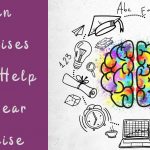Hearing loss, whether develop through aging or through an exposure to noise, can lead to cognitive decrease, social isolation and depression. But according to a range of studies, treating your hearing loss could actually strengthen your brain. Here is some evidence of how treating your hearing with hearing aids can help support your brain’s activities.
How hearing aids improves brain function and working memory
A new study from the University of Maryland has shown that the use of hearing aids can enhance brain function and working memory. The study was recently published in Clinical Neurophysiology and Neuropsychology.
The research team followed a group of users of first-time hearing aids with mild to moderate hearing loss over a six-month period. They used a range of behavioral and cognitive assessments to evaluate the hearing, working memory, attention and brain processing speed of the individuals involved. They also evaluated electromagnetic activity generated by the participants’ auditory cortex when confronted with speech sounds.
After six months, participants displayed better memory, better neural speech processing and an easier time listening when using the hearing aids.
These conclusions were echoed in a separate study by Jamie Desjardins, Ph.D., an assistant professor in the speech-language pathology program at The University of Texas at El Paso.
He researched a group of people in the 50s and 60s with sensorineural hearing loss who had never used hearing aids before. He tested the cognitive abilities the subject, including their working memory, selective attention and processing speed capabilities.
Tests showed improved results in working memory and selective attention over two weeks, and the processing pace at which respondents performed tasks was noticeably quicker.
“If you have some hearing impairment and you’re not using hearing aids, maybe you can figure out what the person has said, but that comes with a cost,” Desjardins said. “You may actually be using the majority of your cognitive resources in order to figure out that message.”
How hearing aids can reduce the risk of dementia
Dementia is an umbrella term that depicts a group of health issues related to a loss in memory which reduces the ability of a person to do everyday tasks. We already established that hearing aids can improve working memory and brain functions, but they have also been linked to a sharp reduction in cognitive decline.
Based on recent research from the UK, cognitive decline which impacts memory and processing speed patients ‘ hearing is reduced at a rate of 75% after the use of hearing aids, according to research by academics at the University of Manchester in the UK.
How do hearing aids improve memory and reduce the risk of dementia?
How can hearing aids prevent memory loss? In short, hearing aids help stimulate the brain through increasing speech understanding, which individuals with hearing loss might have lost. They help you remember the sounds that you were not able to hear before.
This can include high-pitched sounds like birdsong, rain or even the voices of children. These sound signals continue to pour into your brain with the help of hearing aids.
Language is a key influence in maintaining cognitive health and memory— it has been shown that those who talk many languages have cognitive advantages compared to individuals who can only speak one language.
Slowly losing control of their capacity for language is one of the hardest struggles individuals with hearing loss face. But by using hearing aids, you can more easily understand others and reply appropriately, helping maintain these neural connections which are so necessary to maintaining your memory and cognitive health.
Fit Hearing Audiology Network
There are so many benefits to wearing hearing aids, and help maintaining your brain health is just the start. Hearing aids of today have a wide variety of features, from rechargeable devices like the Signia Styletto, to made-for-smartphone devices like the Starkey Halo IQ. The most effective way to treat your hearing loss is through the use of hearing aids, professionally fitted by an audiologist or hearing aid practitioner. If you think you have hearing loss, get it checked by a hearing professional and treat it immediately in order to keep your brain healthy.






